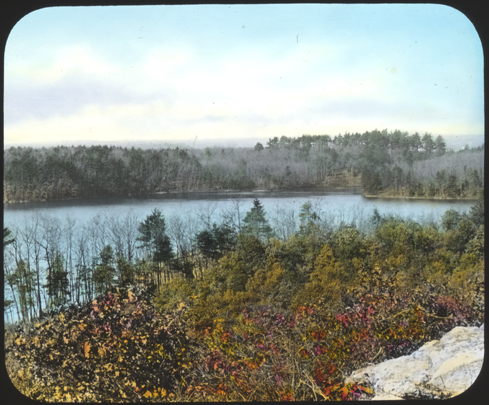 |
49.
Herbert Wendell Gleason. Walden from Emerson’s Cliff.
From hand-colored glass lantern slide, from the slide lecture “Thoreau’s
Country,” purchased from H.W. Gleason, 1936.
On October 4, 1844, Emerson wrote his brother William about his recent purchase of land at Walden Pond: “I have lately added an absurdity or two to my usual ones, which I am impatient to tell you of. In one of my solitary wood-walks by Walden Pond, I met two or three men who told me they had come thither to sell & to buy a field, on which they wished me to bid as a purchaser. As it was on the shore of the pond, & now for years I had a sort of daily occupancy in it, I bid on it, & bought it, eleven acres for $8.10 per acre. The next day I carried some of my well-beloved gossips to the same place & they deciding that the field was not good for anything, if Heartwell Bigelow should cut down his pine-grove, I bought, for 125 dollars more, his pretty wood lot of 3 or 4 acres, and so am landlord & waterlord of 14 acres, more or less, on the shore of Walden … ” Emerson’s purchase of land at Walden provided Henry Thoreau with the opportunity he had been looking for to live simply and self-sufficiently in nature and to devote himself to writing. Thoreau built a cabin on and moved to Emerson’s Walden property in 1845. Emerson himself took great pleasure in the peace and beauty of Walden Pond and the Walden Woods. Edward Emerson wrote of his father’s enjoyment of the place: “The garden at home was often a hindrance and care, but he soon bought an estate which brought him unmingled pleasure, first the grove of white pines on the shore of Walden, and later the large tract on the farther shore running up to a rocky pinnacle from which he could look down on the Pond itself, and on the other side to the Lincoln woods and farms, Nobscot blue in the South away beyond Fairhaven and the river gleaming in the afternoon sun.” Emerson often walked to Walden with his children on Sunday afternoons. In 1866 (a mere four years after Thoreau’s death), the Fitchburg Railroad built an amusement park at Walden, on the side of the pond nearest the railroad track. It featured picnic, swimming, and athletic areas, boathouses, footpaths, swings, see-saws, merry-go-rounds, and pavilions for speakers. The construction of this complex distressed local people, Emerson included, who had enjoyed Walden in its undeveloped state. Emerson’s poem “My Garden,” written about Walden and the
surrounding area, appeared in the Atlantic Monthly for December,
1866 (Myerson E169). It was collected in May-Day and Other Pieces
(1867; Myerson A28).
MY GARDEN If I could put my woods in song
In my plot no tulips blow,—
My garden is a forest ledge
Here once the Deluge ploughed,
The sowers made haste to depart,—
Waters that wash my garden side
Hither hasted, in old time, Jove,
Keen ears can catch a syllable,
Aeolian harps in the pine
Canst thou copy in verse one chime
Wonderful verse of the gods,
Ever the words of the gods resound;
Wandering voices in the air
When the shadow fell on the lake,
But the meanings cleave to the lake,
These the fates of men forecast,
No image in this online display may be reproduced in any form, including electronic, without permission from the Curator of Special Collections of the Concord Free Public Library.
Next Entry - Previous Entry - Back to Section VI Contents Listing - Back to Exhibition Introduction - Back to Exhibition Table of Contents |